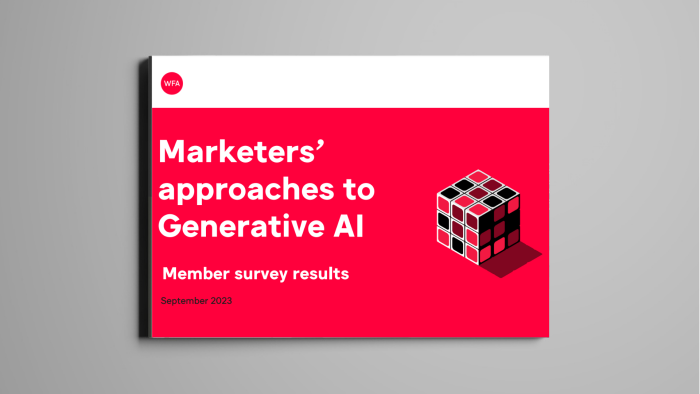GenAI figures in most brands’ marketing plans, says new WFA research
A new survey conducted by WFA finds that three in four companies already use GenAI or plan to use it soon. Optimism about its potential is matched by concern about the risks to brand reputation. Eight in ten have developed or are developing internal policies on use of GenAI.
Share this post

The immediate internal gains from using GenAI were cited as improved productivity and efficiency (89%), reduced costs (76%) and improved creativity (46%).
According to a new WFA survey, over three quarters of brand owners (78%) are using or plan to use generative AI in their marketing strategies. 45% of survey respondents indicated they are already using AI, while one in three (33%) said they plan to do so soon. Only 14% of respondents said they had no current plans to use AI for their marketing. Respondents reported that generative AI is most commonly being used in the areas of content creation (74%), personalisation and customer experience (58%) and content ideation (55%).
Cautiously optimistic
Most marketers are cautiously optimistic about the potential of AI in driving business growth, with respondents averaging seven out of ten when asked to grade their levels of enthusiasm. However, policy and legal respondents rated their enthusiasm much lower, at 4.5 out of 10. The immediate internal gains from using generative AI were cited as improved productivity and efficiency (89%), reduced costs (76%) and improved creativity (46%).
Most respondents remain wary about the potential risks of generative AI to brand reputation. Marketers on average rated their concern at six out of ten compared to their colleagues in policy and legal rating their concern at eight out of ten.
The most commonly cited risks were data protection and privacy and IP and copyright, with 77% of respondents saying they were extremely or moderately concerned in both areas. Other areas of concern were brand safety and adjacency and diversity, equity and inclusion with 71% and 54% of respondents saying they were extremely or moderately concerned respectively. Other concerns cited included regulatory developments, broader societal issues such as job displacement, impact on the creative industries and environmental sustainability.
Upskilling employees on AI
Respondents identified a need for in-house capabilities training and greater transparency across their supply chains. 71% of respondents said that they are planning on upskilling their employees on effective AI use as part of a responsible marketing strategy. 50% of respondents said they were ‘not fully or somewhat aware’ of how their supply chain uses generative AI on their behalf and 43% said they have reviewed or are reviewing service agreements with providers.
“We need to review the opportunities and challenges through the prism of all business functions, so we can put in place the measures necessary to give marketers the confidence they need to make the most of the exciting possibilities that AI can offer to deliver business growth”, said Stephan Loerke, CEO of WFA.
Policies and regulations
There is caution holding the industry back from exploring generative AI’s full potential from driving more effective marketing communications. 52% of respondents agreed that existing regulations (i.e. around data protection, copyright, non-discrimination) are insufficient to address the risks of using generative AI in marketing. Respondents point to a lot of ongoing internal work to mitigate against the challenges with 81% saying they have developed or are in the process of developing internal policies on the use of generative AI. 45% of respondents claim to have policies in place around data protection and privacy while 37% say they have policies under development. But fewer respondents claim to have measures in place for brand safety and adjacency (32%), IP and copyright (29%), DEI (21%) and environmental sustainability (15%) despite the well documented carbon emissions associated with generative AI.
Client AI strategies differ from company to company. Only 5% of respondents reported having a Chief AI officer. One in five respondents (19%) said a Chief Digital Officer was leading their AI strategy while the highest proportion (40%) claimed a purpose built cross-functional team was leading their approach. Almost one in four said they have no single AI lead, opting instead for a decentralised approach.
In seven out of ten cases marketing teams (73%) and legal (71%) were involved in the overall AI strategy. Marketing insights (48%), media (45%), policy and corporate affairs (34%) and sourcing (27%) are reported to be less involved. A half of respondents (50%) claim to be working with third parties such as agencies, consultancies or tech partners.
This survey aims to better understand how senior professionals across marketing, media, insights, sourcing, policy and legal functions view the opportunities and challenges of generative AI for their brand marketing strategies. The findings are based on feedback collated in September 2023 from 69 senior respondents across 55 WFA member companies, which spend a cumulative total of US$ 118 billion in global marketing. The survey results will be presented to the WFA Executive Committee on September 26th and will be used as a starting point for how the various WFA peer-to-peer forums seek to develop plans to address the challenges raised by AI in their respective fields.
This survey is WFA member content only. If you'd like to know more about WFA membership, please reach out to membership@wfanet.org.




